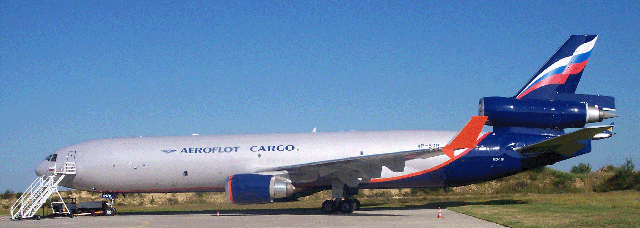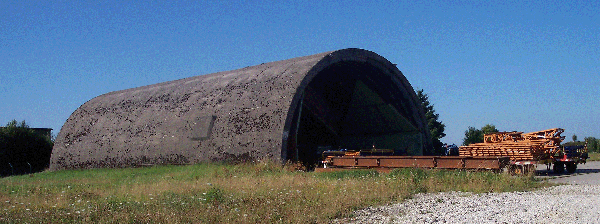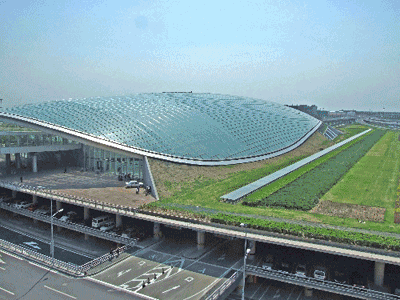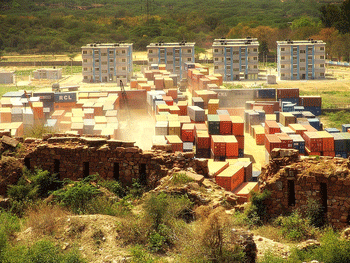Aeroflot Cargo Rolls Over Fleet

Splendid weather, lots of
cameras ready for getting to work and two fire engines squirting water
into the sky.
It was a moment out of the norm a couple
weeks ago when Aeroflot Cargo's MD-11F taxied at Frankfurt-Hahn.
Soon as the doors of the craft swung open
the plane was given a warm welcome by local notables such as Rhineland-Palatinate's
Minister of Transport Hendrik Hering, Hahn General Manager Joerg Schumacher
and other big shots.
In the middle of all this with a broad
grin on his face stood Oleg Korolev, Aeroflot Cargo's Director General
and CEO.
 Oleg
Korolev was born in the City of Rybinsk of the Yaroslavl Oblast on June
4, 1963.
Oleg
Korolev was born in the City of Rybinsk of the Yaroslavl Oblast on June
4, 1963.
He graduated the Leningrad Institute of
Aviation Instrument Engineering as an Engineer-Mathematician.
Later Mr. Korolev worked at NIIOKB “Orbita”
in the “Alak” aviation company.
In 1994 Oleg joined Aeroflot Cargo where
from 1996 through 2003 he served as the assistant representative of
the Company in Japan (Tokyo), and as the chief of commercial support
of cargo operations in the central management of the company.
From 2003 until 2007 when he was named
to his current post, Mr. Korolev was regional representative of Aeroflot
Cargo in charge of cargo operations in Europe.
After the hype and hoopla had slowed down
a bit he offered Air Cargo News FlyingTypers
an exclusive interview.
FT: Oleg, you started
deploying MD-11F on intercontinental routes between
Hahn and Far east via Moscow or Almaty.
How many of these aircraft do you want to add to your fleet?
OK: We leased three from
Boeing Capital for a timeframe of eight years. Two of these freighters
are already in service, the third will follow soon. They'll be utilized
on international routes. So will the three additional MD-11F that we
purchased and that are scheduled to arrive next year.
FT: What's the fate of
your three DC-10Fs?
OK: We'll get rid of them
by replacing them with the MD-11s. They are aging, need a lot of maintenance
and consume quite some fuel. By December the DC-10Fs will be gone.
FT: That's good news for
your clients and airports like Frankfurt-Hahn because the MD-11Fs can
carry around 90 tons per flight whereas the DC-10Fs are only able to
lift 62 tons.
OK: By bringing in the
MD-11Fs we will indeed increase our capacity by around 23 tons per flight
compared to the older Douglas aircraft.
That's quite a push for Hahn because the first three MD-11Fs will be
based at this airport.
FT: Do you also intend
to offer your clients new destinations?
OK: Presently we offer
ten frequencies to and from Frankfurt-Hahn, our European gateway. With
peak time coming we will gradually increase those services up to sixteen
weekly frequencies. Consequently Hahn will see more tonnage, soon.
 Hahn
“Bunkers” Live… The only threat these days is
from too much friendly aircraft traffic, still these concrete “bunkers”
that once housed fighter aircraft still serve the former U.S. Air
Force base known today as Hahn Airport. Hahn
“Bunkers” Live… The only threat these days is
from too much friendly aircraft traffic, still these concrete “bunkers”
that once housed fighter aircraft still serve the former U.S. Air
Force base known today as Hahn Airport.
To be certain many of the cold war bunkers are
gone, but several remain, and are filled with all types of commercial
goods and storage. |
FT: Any
other routes you got in your drawer?
OK: We plan to fly from Moscow to Saragossa in Spain, more often to
Finland's capital Helsinki and we are looking at places like India and
the
United Arab Emirates as well.
FT: What about the brand
new Ilyushin IL-96-400T? When will these freighters arrive?
OK: The first craft comes
at the end of August, the second by end of September and number three
in December. At the beginning we intend to deploy them on domestic routes
and will add them to our intercontinental network after having gained
sufficient experiences.
FT: According to rumors
launch customer Atlant Soyuz Airlines refused acceptance of the freighters
because of their poor performance. What's your position on this?
OK: We expect them to
perform as guaranteed by producer Ilyushin. If not, they will have to
pay the difference in costs to us, be it because of higher fuel consumption
or other causes. This has been agreed to very clearly in our purchase
contract with Ilyushin. Therefore, the financial risk is not on our
side.
FT: Originally you intended
to deploy the MD-11Fs in 2006.
What caused this huge time delay?
OK: They formerly belonged
to Brazilian carrier Varig.They had to be converted, a lot of documentation,
paperwork etc. was necessary, which was time consuming. But the biggest
obstacle was the Russian authorities who demanded a complete new licensing
process, which we refused. Their view was that the MD-11F is a new aircraft
that needed to pass the test and registration process from A to Z.
We finally convinced them that we were
only the first Russian operator of this freighter type and that it did
not need to go through all the flight tests that normally are required
for newly produced aircraft.
FT: You must have lost
a lot of money since you had the aircraft but could not utilize them.
OK: Absolutely. The leasing
contract commenced last January, now it's July. Ever since we had to
pay big money to lessor Boeing without having any commercial benefits
from the aircraft.
FT: In other words you
will have to announce quite some losses at year's end.
OK: Unfortunately yes.
Although we expect an increase in tonnage we will not be able to compensate
the cost we had.
FT: How much tonnage do
you expect to end up with this year?
OK: Roughly 150,000 tons
as compared to 135,000 tons in 2007. Although the fuel price is exploding
and the competition is getting stiff and stiffer we are quite confident
to increase our market share in the years to come.
First because of the fleet-rollover that
we just started, secondly because of our Russian home market that is
growing very rapidly and last but not least, due to a steady enlargement
of our international network that we've got plans for in the drawer.
FT: Are there also ambitions
to get bigger freighters like Boeing's B777F for instance.
OK:: Yes, we consider
enlarging our fleet with bigger cargo aircraft that are able to fly
on long hauls routes nonstop. But nothing definite has been decided
yet.
FT:: You are a member
of the SkyTeam Cargo alliance.
But you still don't offer the typical product range of that club. Why?
OK: We are considering
that and I think by 2010 will implement their offerings.
Heiner Siegmund
BCIA Gets Olympic
Lift

Beijing Capital International Airport
(BCIA) is seeing record flights and passenger numbers during this Olympic
month, as numbers given by Civil Aviation Administration of China (CAAC)
estimate action at the gateway with only two days until the big sports
show opens to be 1,500 flights and 260,000 passengers per day.
However, before anybody dances in the
streets from this new record activity, BCIA needs to come to terms with
the sharp decline in airport business during the first half year operation
in 2008.
On July 31, ten days before the Olympics,
BCIA issued a profit warning for its 2008 interim results on falling
demand and rising costs.
Net profits for the six months of 2008,
may fall significantly from the RMB567 million (USD$83.4 Million) in
the first half of 2007.
“From August 2007 to March 2008,
out of security concern for the Olympic Games, CAAC imposed limitation
on flight throughput of the airport, from 1,100 flights per day to 1,000
flights, resulting in a less than expected passenger volume.”
Mr. Shuying, Board Secretary of BCIA explained
to Air Cargo News FlyingTypers.
“The introduction of the Third Terminal
drove operating costs upward, but the profits of this new terminal are
incomparable with the existing ones, as parallel increase in passenger
volume takes time.”
BCIA also said that the airport has also
been impacted by the slowdown of global economy, which has weakened
international aviation transportation demand.
Of course high jet fuel price has also
dented some domestic Chinese airlines causing cancelled flights and
postponement of plans to add aircraft.
For the second half of 2008, Mr. Shu projects
better performance as compared to the same period last year, “because
the limitation on flight throughput is lifted.”
And then there are those Olympic numbers
in the count…
David
India
CONCOR Goes Air Cargo


From a company which only ran container
specials from Indian port cities to different destination in the country
– freight trains with containers – CONCOR (Container Corporation
of India) has plans to go global and its first venture in that field
would be the setting up of airfreight stations.
For a conservative organization like CONCOR,
which is owned by the government, the move will see a major diversification
by the company.
First, it will see the company entering
into the air cargo sector and second, it will be the first step to its
becoming a multimodal logistics services provider.
 An
upbeat Rakesh Mehrotra, Managing Director, outlined the growth plans.
CONCOR, he pointed out, provides customs clearance and other related
facilities at most of its inland container depots (ICDs). So, the foray
into the aircargo segment would be a natural extension. In fact, CONCOR
has air cargo complexes in Bangalore and Nasik (in western India) airports.
"We want to set up air freight stations at 15-20 of our ICDs. These
would provide a whole range of services: from bonded warehousing, palletization
as well as custom clearance and other formalities that are usual for
the air cargo business."
An
upbeat Rakesh Mehrotra, Managing Director, outlined the growth plans.
CONCOR, he pointed out, provides customs clearance and other related
facilities at most of its inland container depots (ICDs). So, the foray
into the aircargo segment would be a natural extension. In fact, CONCOR
has air cargo complexes in Bangalore and Nasik (in western India) airports.
"We want to set up air freight stations at 15-20 of our ICDs. These
would provide a whole range of services: from bonded warehousing, palletization
as well as custom clearance and other formalities that are usual for
the air cargo business."
CONCOR started scouting around for an
alliance partner sometime ago. The alliance, Mr. Mehrotra informed,
would later be converted into a joint venture. The timing, of course,
would depend on how fast the business picked up. "We have invited
expressions of interest from a number of people and we have developed
business plans with three of them. We are now evaluating which partners
we should go with," he said.
Work on transforming the ICDs to airfreight
stations would begin by the end of this year. Mr Mehrotra also said
that these stations would be smaller than the setups in Nasik and Bangalore
airports. CONCOR would not be investing too much since the basic infrastructure
exists at these ICDs. All it has to do is ramp up its services. As the
business grows, Mr. Mehrotra said, CONCOR would even "set up greenfield
air-freight stations". CONCOR has ambitious plans for its global
foray. Mr Mehrotra said: "We will start a terminal at Nepal."
This will be in addition to the one which is scheduled to start in Bangladesh
and Pakistan soon.
The CONCOR story started in 1988 with
its container trains service. As a government organization, it was one
of the first to promote exports from the country with its terminals
at different destinations. It started its operations by taking over
seven ICDs from the Indian Railways and has now grown to a network of
57 terminals. As Mr. Mehrotra put it, CONCOR has "brought the ports
to the hinterlands. We hope that whatever the growth in the logistics
business, we would still be the dominant player providing infrastructure
and trade support to the exim (export and import) and domestic markets.”
Over the last few years, the organization
has diversified with the air freight station business as its latest
move. Its first step was in the port sector, where it took the joint
venture route. It now has two operating ports and is on the lookout
for more such opportunities.
Unfazed by the competition, CONCOR achieved
a growth rate of 16 percent in export-import and 21 percent in the domestic
business.
Last year it handled 2.5 million TEUs
(twenty feet equivalent units) and this year it expects to cross three
million TEUs.
Tirthankar Ghosh



